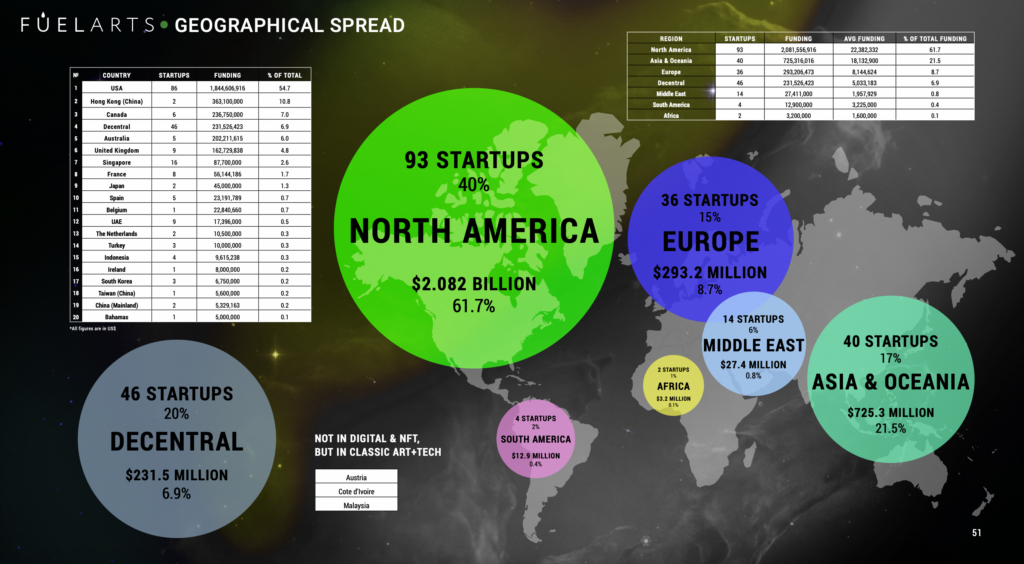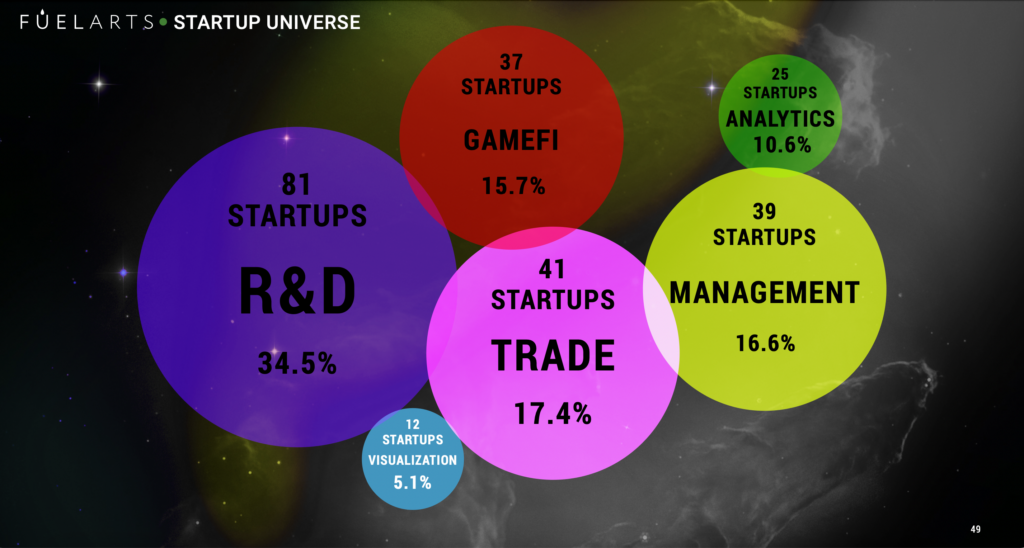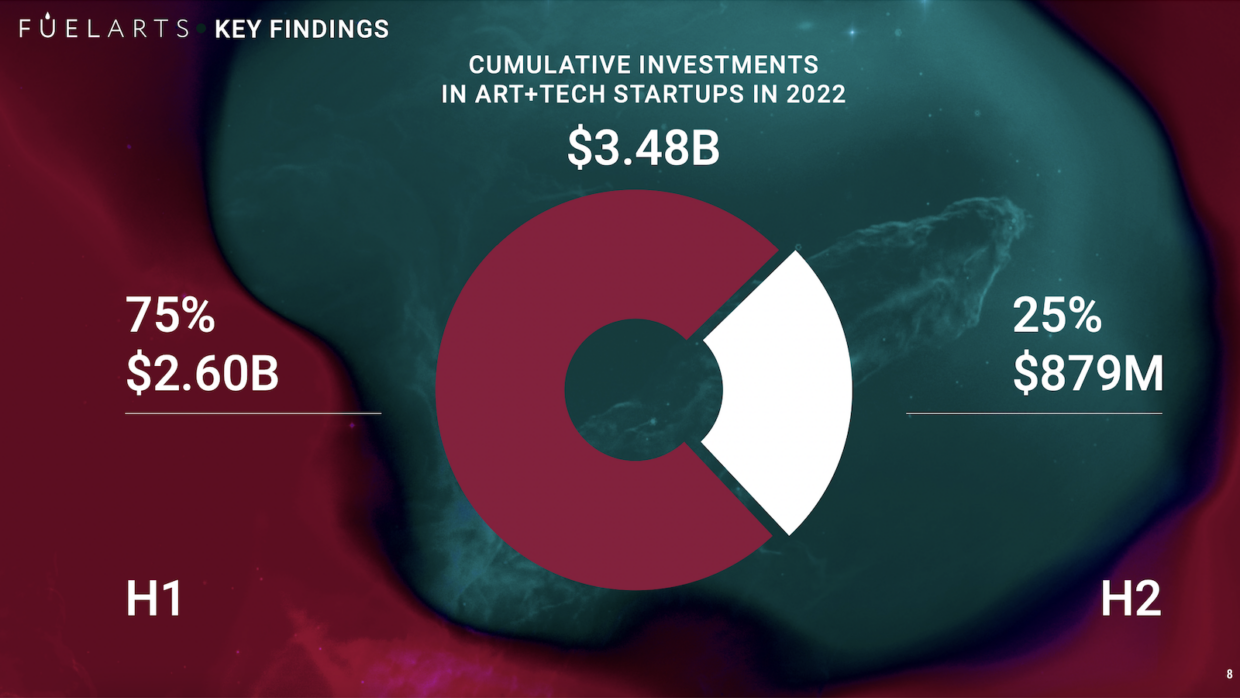The art and tech-focused investment firm FUELARTS released its annual Art+Tech & NFT Startups in 2023 report on March 14th.
As in its 2022 report, this edition focuses on cumulative investments in startups related to art, technology, and NFTs. Covering the current state of the market, investor profiles, and providing an overview of investment trends, the report has also added a focus on the Tezos Art ecosystem, offering the first comprehensive overview of Tezos’ art vertical and its recent developments. The report further provides an outlook on investment trends in the Art+Tech sector for 2023, drawing from the perspectives of startups, strategists, and the Fuelarts platform itself.
Despite the challenges of 2022 — including the FTX case — we are moving forward into what now appears to be a season likely split between AI startups and individual heroes.
Here are the key insights from the report:

Investment: Focused on Content
R&D (content production) startups received the highest number of investments in 2022, with $1.647 billion going to 81 companies. The second-largest investment amount went to GameFi, with companies receiving $790.4 million spread across 37 firms. Companies involved with the physical art market received a relatively small total, with only about 3 percent of total funding. Most of these companies were concentrated in the United States (92 companies), followed by decentralized startups (46 companies). The report also found that 81.9 percent of investors deployed their money in only one Art+Tech & NFT startup; everyone wants to be (and invest in) the next Yuga Labs.
The report argues that one of the highlights of 2022 was “the decision of MoMA to sell $70 million worth of art for the subsequent mass purchase of digital content for the collection of the largest contemporary art museum.” It also points to the Miami Institute of Contemporary Art showcasing two Crypto Punks in December, making it clear that institutions are embracing NFTs, not just the startup system.
Ecosystem: Community and Conferences
In 2022, the primary means of finding new investors for startups came mostly through recommendations from friends (47 percent), word of mouth (40 percent), and networking at conferences (33 percent). Conferences, both those as established as NFT.NYC and Decentral, and smaller-scale ones such as NFT Paris and Miami, may take on greater prominence this year as community-building events and battlegrounds for investor attention.
After all, everyone at an NFT conference is probably already sold on its utility. Fifty-three percent of startups planned to attend NFT.NYC and Decentral.
Nearly half of those surveyed (47 percent) were interested in attending the Art+Tech Summit by Christie’s and Tezos Talks at various Art Basel locations, including other crypto conferences. Paul Schmidt, a member of the core team at (fx)hash, noted that while there was “some initial confusion and skepticism about the use of blockchain technology in the art world, particularly with regards to generative art,” there has been a growing understanding both about what the (fx)hash platform does and the usage of blockchain, partially thanks to events like Art Basel. Schmidt mentioned that “Art Basel gave us visibility and allowed us to connect with people who are interested in the space.”

AI is Coming…
Fuelarts’ report noted that 13 percent of startups do not intend to use AI in their technical solutions, but the remaining 87 percent broke down in ‘favor’ of AI in some capacity. Twenty-seven percent of startups were considering the possibility of using AI in the future, another 27 percent are actively exploring this technology, 13 percent are working on integrating AI technology into their practice, and the remaining 20 percent initially included AI within their system.
The rise of ChatGPT (which gained 100 million users in 2 months) and other platforms like Midjourney and ArtStation has contributed to growing public awareness of AI and its possibilities, as well as fueled intense debates. While scandals surrounding artwork creation from AI and debates on who ‘owns’ the images produced have flourished, AI hasn’t declined. On the contrary, it has become even more popular.
Sandy Carter, COO, and Head of Business Development at Unstoppable Domains noted that the development and implementation of AI technologies are likely going to flourish. Both self-sufficient, all-in-one products, as well as a “variety of SaaS solutions that are quick and inexpensive,” may emerge. An NFT marketplace might become a generator of original images, among other interesting evolutions.
However, Carter also warns against causing a rush to AI similar to the rush to blockchain in 2017 when start-ups “hastily integrated blockchains.”



